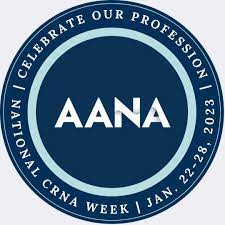National CRNA Week kicked off its inaugural celebration when the American Association of Nurse Anesthesiology introduced it in 2000. Since then one week in January (this year it’s January 22-28) is designated as a time to celebrate the nearly 60,000 nurse anesthetists practicing in the United States.
Certified Registered Nurse Anesthetists (CRNAs) work collaboratively with healthcare teams or independently. They administer or assist with administering anesthesia for patients undergoing procedures in various healthcare settings. CRNAs can be present for planned surgical procedures, in emergency settings, in pain management clinics, in dental offices, and in birth centers to name a few.
Nurse anesthetists are responsible for caring for and monitoring a patient’s anesthesiology needs during a procedure, but their work pre- and post-procedure are critical. They will gather medical history, medication information, and assess the patient’s physical and emotional condition when possible. They are constantly looking for and identifying any potential issues that could interfere with plans for anesthesia.
As with other nursing specialties, CRNAs have taken on more responsibility and needed to master increasingly complex healthcare conditions and tech-based equipment. Because of this, changes to the practice entry requirements now require all nurses entering a CRNA program to exit with a doctor of nursing practice (DNP) or a Doctorate of Nursing Anesthesia Practice (DNAP) . Practicing CRNAs aren’t required to return to school for this additional advanced degree if they already have a master’s degree and have been in practice. Although it’s not required, some nurses may find that employment parameters are changing and that the DNP might be a requirement in a new place of employment.
CRNAs have careers that are dynamic and exciting. They can work directly with patients or they may choose to work in administration where they can have an impact on the conditions for patients and nurses. CRNAs also have options to work in government settings or to become active within committees to help shape the policies that surround CRNA work and career expectations. As CRNAs take on more leadership roles, they can use their direct real-world experience to inform the nuances of proposed changes.
As in all nursing specialties, time spent on the job is an excellent way to build skills and empathy for patients. CRNAs will want to continue learning about the rapid changes in the field with certification through the National Board of Certification and Recertification for Nurse Anesthetists (NBCRNA). Certification, which needs to be renewed to stay current, helps you remain informed on the latest developments that impact the duties you perform in your work. By staying up-to-date on the most current techniques and developments, you’ll be able to offer high-quality patient care that will result in better outcomes for your patients and the best performance by your team. Certification is a way to learn about everything from patient care to technological changes in equipment that can change your process.
Celebrate the CRNAs on your team this week and if you’re a CRNA take time this week to reflect on the work you do with your patients and your healthcare team. Be proud of the change you make in each patient’s life as you perform a critical task within the process.
- WOC Nurses Week Highlights Specialty - April 16, 2024
- Honoring Radiology Nurses Day on April 12 - April 12, 2024
- Travel Offers New Career Possibilities - April 8, 2024



